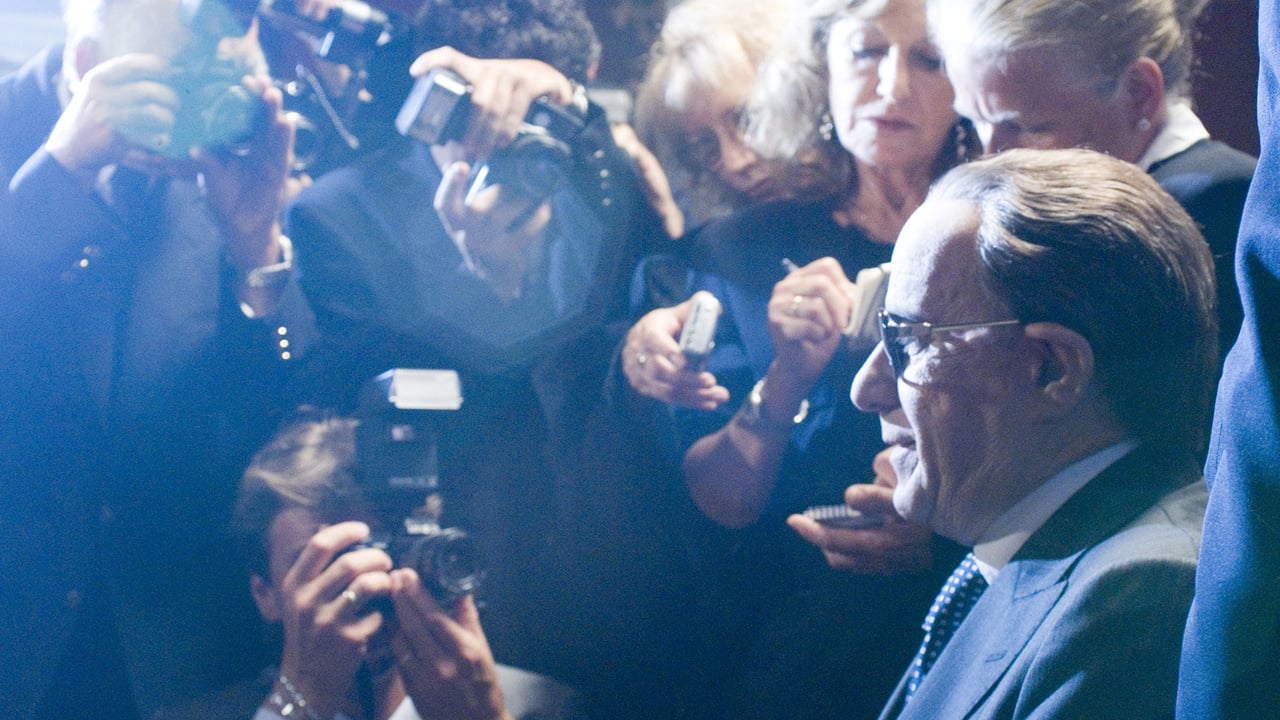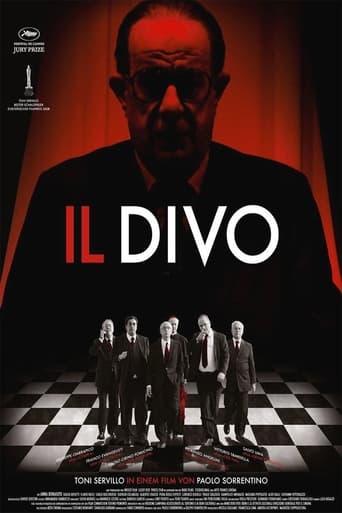

Il Divo charts the vast and eventful reign that former Italian prime- minister Giulio Andreotti had over Italy. He served as prime minister a number of times between 1976 and 1992, and also held positions of Defence Minister and Foreign Minister. During this time he was widely believed to have strong links to the Mafia, and was placed on trial in the late 1990's for his involvement in the murder of a journalist who was suggested to have held documents that strongly implicated Andreotti in criminal activities. The film jumps back and forth in time, and shows Andreotti's enigmatic presence of almost divine levels, and his guilt over his refusal to negotiate in the kidnapping and eventual murder of fellow Christian Democrat Aldo Moro.This is no ordinary biography. It is an unconventional, highly stylised comedy-drama that is infuriating, exciting, informative and exhausting. Director Paolo Sorrentino throws so many facts, figures and names at you in rapid fashion that it all becomes a blur, it is near impossible to keep up, especially if your knowledge of Italian politics around this time is slim (which was the case for me). But it eventually becomes clear that all this information is irrelevant. It's simply a way to show just how involved Andreotti was virtually everything that happened. He was so influential, so powerful that nothing escaped him. And nothing could touch him.Toni Servillo's simply brilliant performance conveys everything you need to know about Andreotti. He is not physically intimidating, but instead he is hunched, softly-spoken and extremely strange-looking. But Andreotti does not need to move for anyone. His extreme intelligence and near-supernatural ability to get out of situations by doing next to nothing only increases his divine status. We see the best and worst of Andreotti, but Sorrentino is not trying to force an opinion of him out of us, but instead he has directed an outrageous film about an outrageous man. 'Il Divo', literally translated, means 'the star', but suggests 'the divine one', and was the nickname given to Julius Caesar.www.the-wrath-of-blog.blogspot.com
... View MoreGiulio Andreotti can be seen as both the precursor to, and the antithesis of, Silvio Belusconi: an Italian politician with his fingers on every lever that led to power, accused of everything but convicted of nothing, and yet peculiarly devoid of conventional charisma. A sense of a particularity, of a man who had become nothing beyond a carefully constructed defence of his own behaviour, was nicely captured in Tim Parks' fictional work 'Destiny'; and we get the same feeling in 'Il Divo', a biopic with an extraordinary performance Toni Sevillo by in the lead role. What neither offer is definitive, or even speculative, resolution of the enigma and his actions; just a chilling yet plausible portrait of the man. Yet without providing clear answers, something else must provide the story. In Parks' book, Andreotti was a bit part; in the film, there's no other narrative, and sometimes the direction feels a little too heavy, overdone perhaps because there isn't a smooth tale holding things together. And the music on the soundtrack seems deliberately incongruous, thrown into the mix to provide some variation in tone that would otherwise have been lacking. But Servillo's performance more than compensates; it will lead you wanting the same answers, one suspects, that everyone has wanted from Andreotti for a long long time.
... View MoreI'm not entirely sure how to appraise this film of Paolo Sorrentino. Whilst it's clearly a vampirically styled dramatisation of pre- Berlusconi political corruption whether or not it's effective satire is very difficult to judge. Knowing no Italian, I watched with English subtitles and, conflated with my ignorance of Italian political history I feel I missed the weighty body blows of the film.However, to exhaust the metaphor, I was in the ring nonetheless and appreciated the dancing footwork of Sorretino. The bare technique of the film-making is first class, including a hyper-studied turn from Toni Servillo as the prinicipal Giulio Andreotti, always on the precipice of Fluck & Law-level parody.In the end I don't think I cared enough. I can only judge the film on the impression it gives as I felt at a remove in terms of first hand information - and it seems that Sorrentino has little compassion for the characters in office. Maybe I'll try it again one day when I'm better informed. 4/10
... View MoreThe cinematography is/was excellent. I have to admit that this movie, because of my lack of familiarity with the subject was a hard thing to watch. It's like a thick heavy piece of dark multi-grain bread. You know it has a lot of substance but it's hard to enjoy.I'm one of those people at the movie rental places that the clerk is always telling, "you know....this is subtitled." As if I'm going to drop it on the counter- realizing, suddenly (oh my God) that this is A FOREIGN FILM- and, realizing my mistake, thanks to that warning, run back down the aisle to grab a copy of "Police Academy 12".But, that's not me. I really do enjoy foreign cinema- most of it is incredibly rich and fulfilling. I just want to give everyone a little 'heads-up' without revealing any 'spoilers', that this baby is thick, it's dark, and like the aforementioned bread, nutritious but not very enjoyable to digest.
... View More